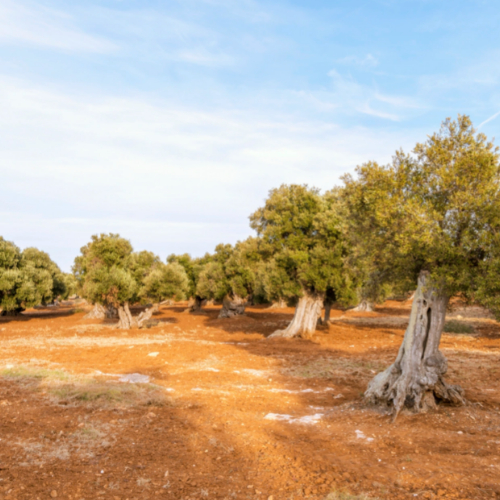Salento, located at the southern end of Puglia, is a land rich in history, traditions and flavors, where olive oil represents one of the most valuable elements of the local gastronomic culture. The majestic olive trees that have populated these lands for centuries are the symbol of an ancient oil production of the highest quality, which characterizes the very identity of the area. Exploring the world of olive oil and olive trees in Salento means getting in touch with a centuries-old heritage, based on cultivation techniques handed down from generation to generation and a deep passion for nature.
The History of the Olive Trees of Salento
Olive trees have been an integral part of the Salento landscape since ancient times. Introduced to the region probably by the Greeks, it has become one of the symbols of Mediterranean culture. Over the centuries, the olive tree has found in the arid and sunny lands of Salento an ideal habitat. It is here that plants have adapted and developed into extraordinary, sometimes monumental forms, achieving unique size and longevity. Some specimens are more than a thousand years old, true silent giants that stand the test of time and tell stories of hard work, dedication and love for the land.
The Production of Salento Olive Oil
Salento oil is renowned for its intense, fruity flavor, obtained mainly from the “Ogliarola Salentina” and “Cellina di Nardò” olive varieties. These cultivars are perfectly adapted to the climate and soil of Salento, giving the oil an unmistakable personality of herbaceous scents, hints of almond and a pleasant bitter and spicy note. Salento’s extra virgin olive oil is appreciated both nationally and internationally for its superior quality, which comes from processing methods that respect tradition while incorporating modern cold extraction techniques to preserve the product’s nutritional and organoleptic properties to the fullest.
The Nutritional Properties of Salento Oil.
Salento extra virgin olive oil is a valuable health food, as it is rich in antioxidants, polyphenols and monounsaturated fats. Several scientific studies have highlighted the benefits of these components in protecting the heart, reducing the risk of cardiovascular disease, and contributing to a healthy metabolic balance. In a balanced diet, Salento oil is not just a condiment, but a true ally for well-being. In addition, its high vitamin E content makes it a potent anti-inflammatory and a valuable aid in fighting the signs of aging.
Xylella and the Resilience of Salento’s Olive Groves.
In recent years, Salento’s olive groves have been hit hard by Xylella fastidiosa, a bacterium that has devastated thousands of plants across the territory. This plague has brought many producers to their knees, and has threatened the entire Salento olive sector. However, through the efforts of researchers, agronomists and farmers, work is underway to find resistant solutions to the disease, such as the introduction of more resilient olive varieties and the spread of innovative cultivation techniques. The local community continues to fight to preserve this precious heritage, demonstrating tremendous resilience and love for their land.
Salento Oil as a Cultural and Tourist Experience.
For those visiting Salento, olive oil is also a cultural experience. Many ancient olive mills open their doors to tourists, offering tasting tours and guided tours that allow visitors to discover the secrets of production and traditions related to the olive tree. Participating in these activities is not just about learning about oil, but about immersing oneself in a culture that makes hospitality and connection to the land its founding values.



